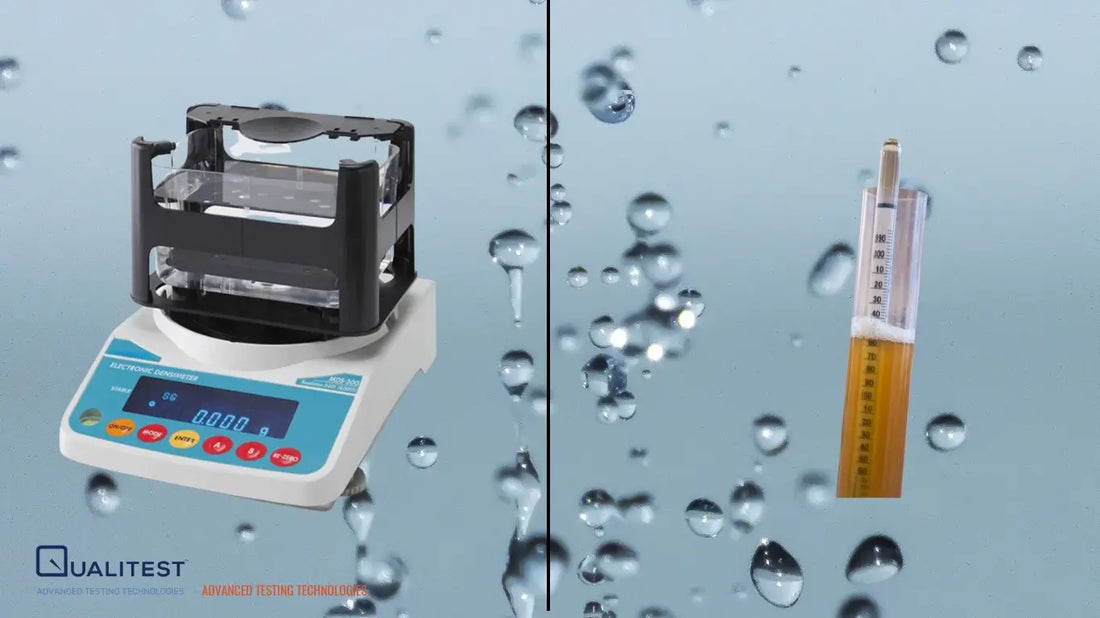Subscribe To Our Newsletter
Get the latest updates on new products and upcoming sales
Available 24/7 at 1.877.884.TEST (8378)

When you're running a business that makes physical products, getting your material checks right isn't just a small detail—it's the whole ballgame.
As people who supply this kind of equipment, we've seen how the right tool can make a process smooth and profitable, while the wrong one causes constant headaches. That’s why we need to have a real conversation about the densimeter vs hydrometer situation.
Yes, they both check a liquid's properties, but how they do it and the kind of answers they give you are night and day.
A digital densimeter is a piece of equipment purpose-built to give you the absolute density of a material. It provides a direct, specific value, such as grams per cubic centimeter, which is exactly the kind of data needed for serious quality verification.
The densimeters we supply are based on a brilliantly simple idea from Archimedes.
In simple terms, when a plummet is submerged, the liquid pushes up on it with a certain force. Our instruments measure this buoyant force with extreme precision and instantly calculate a direct density reading.
Read more: How Does a Densimeter Work? How to Use It?
We stand behind this technology because it offers an exceptional combination of accuracy and operational flexibility. Its chief advantage is that it isn't limited to liquids; it is an essential tool for verifying the density of solid materials, including plastics, rubber, ceramics, and fabricated metals.
And then you have the hydrometer. This is the old-school, floating glass tube that gives you an estimate of specific gravity by comparing your liquid to water. It bobs around in your sample, and you have to squint at the tiny lines on its stem to guess at a reading.
While hydrometers can be useful for very basic, non-critical checks, our experience shows that businesses often move on from them as the need for higher accuracy, repeatable results, and digital record-keeping becomes a priority.
To make the choice clear, this chart breaks down the functional realities of using each instrument in a professional setting. This gets to the heart of the densimeter vs hydrometer decision.
|
Feature |
The Digital Densimeter |
Traditional Glass Hydrometer |
|
Measurement Value |
Provides the direct density (e.g., g/cm³) |
Shows relative density (Specific Gravity) |
|
How Accurate It Is |
Insanely spot-on, with a digital number you can trust. |
Hit-or-miss, depending on who's reading it. |
|
Material Capability |
Does a fantastic job on both liquids AND solids. |
Measures Liquids Only |
|
Operational Speed |
Extremely fast; provides a stable reading in seconds |
Slower; you have to wait for it to settle down and stop moving. |
|
Temperature Effects |
It automatically corrects the reading for temperature. |
Needs manual temperature readings and corrections |
|
Keeping Records |
Sends a perfect digital number for your logs. No typos. |
Manual recording is susceptible to transcription errors |
|
Durability |
Built tough for a real work environment. |
It's glass. One slip and you're buying another one. |
|
Who Can Use It? |
So simple. Anyone can get the exact same right answer. |
Requires specific user skill for consistent readings |
For basic, non-critical applications, a hydrometer might suffice. A hobbyist or a small shop doing rough checks might find it adequate for their needs.
But for a professional manufacturing operation where quality and consistency are tied directly to your profits, we believe a digital densimeter is the only serious choice. This level of precision is what you need to meet industry specs and avoid costly product failures.
Related article: Densimeter vs. Densitometer: What's the Difference?
It’s tempting to look at the densimeter vs hydrometer choice and just compare the upfront price tags. But we always push our clients to look at the bigger financial picture—the total cost of ownership. The money spent replacing broken hydrometers, the payroll hours wasted on slow measurements, and the huge financial risk from one bad batch getting out the door will chew through those initial savings in no time.
We are in the business of providing solutions that add value. An investment in a digital densimeter delivers returns in efficiency, reliability, and the confidence that comes with accurate data. Our cost-effective densimeters help you reduce material waste, save on labor, and protect your brand's reputation for quality.
If your operation depends on accurate data, we should talk. Get in touch with us today, and we can go over your specific needs and find the right densimeter to make your quality process something you can truly count on.
Email have already subscribed!
Get the latest updates on new products and upcoming sales
Thanks for subscribing!
This email has been registered!